|
|
|
Sort Order |
|
|
|
Items / Page
|
|
|
|
|
|
|
| Srl | Item |
| 1 |
ID:
159688
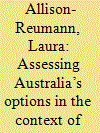

|
|
|
|
|
| Summary/Abstract |
The Brexit vote will fundamentally transform the European Union (EU) and will change how the UK relates to Europe and the rest of the world. What are the implications for Australia at this critical juncture? The UK has been a major player in the Australia–EU relationship, and Australia will now need to recalibrate its approach to both the UK and the EU across a range of policy areas. This article examines the future of Australia–UK and Australia–EU relations in the wake of Brexit, and assesses Australia’s options going forward. The authors advance three considerations. Firstly, Australia’s national interests are best served by adopting a pragmatic rather than nostalgic approach towards future relations with the UK and the EU. Secondly, Australia should avoid pursuing one relationship at the expense of the other and creating a zero-sum dynamic. Finally, Australia’s future strategy must consider broader global developments, such as events within its own region and the US presidency.
|
|
|
|
|
|
|
|
|
|
|
|
|
|
|
|
| 2 |
ID:
159683


|
|
|
|
|
| Summary/Abstract |
This article examines the development of Australia’s relationship with the European Union (EU) by focusing on drivers and obstacles. Underlying the relationship are the burden of memory and common interests and values. It argues that, although the past still resonates, the changes to the range and depth of interests and values have resulted in a more fruitful engagement. It suggests that a history of a negatively framed context of engagement, characterised by Australian critiques of the EU and, in turn, by EU neglect of the relationship, has contributed to distance between the two interlocutors. It is only in recent years that this distance has been bridged and perceptions have changed. Australia has chosen partnerships with the EU that enhance its economic and political choices. Links with a long-term partner, the UK, are being recast as Brexit presents a new challenge at a time of Australia’s stronger engagement with the EU through a key agreement and trade talks. Finally, the article argues that Australia and the EU are critical friends.
|
|
|
|
|
|
|
|
|
|
|
|
|
|
|
|
| 3 |
ID:
159682
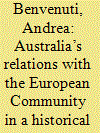

|
|
|
|
|
| Summary/Abstract |
In 2015, Australia and the European Union successfully negotiated a Framework Agreement. This agreement is an essential step in establishing a stronger Australia–European Union partnership and achieving closer bilateral cooperation. For years, negotiating such an agreement had proved impossible. In the 1970s, successive Australian governments showed interest in enhanced collaboration with the European Community, but the political climate for closer relations was far from encouraging. This article explains why this was the case. In doing so, it also explores how the Whitlam and Fraser governments envisaged, framed and developed Australia’s ties with the European Community in the 1970s, and asks whether a more positive approach on their part could have led to a stronger relationship. Based on recently declassified government files, this article shows that although both Whitlam and Fraser fully grasped the importance of the European Community as an emerging international actor and were willing to deepen Australia’s ties with it, significant constraints existed against enhanced bilateral cooperation. With the Common Agricultural Policy still a considerable challenge to Australian economic interests and with the European Community focused mainly on the management of its internal market, broader political considerations were inevitably relegated to the margins of Australia–European Community consultations.
|
|
|
|
|
|
|
|
|
|
|
|
|
|
|
|
| 4 |
ID:
159681
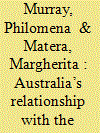

|
|
|
|
|
| Summary/Abstract |
After decades of tension, Australia and the European Union (EU) now have a substantive relationship, interacting and cooperating with each other within a wide range of areas. The relationship is currently at a critical turning point. The Framework Agreement has, for the first time, elevated the relationship to a treaty level. It strengthens Australia–EU actions and interests on bilateral, regional and multilateral issues. There is considerable potential for closer cooperation and more extensive pooling of the resources and capacities of both interlocutors on a range of policies and within the multilateral context. This article provides an assessment of the relationship, the current state of play and key challenges facing the relationship as the EU and Australia forge stronger ties through the conclusion of a Framework Agreement and the commencement of discussions on a Free Trade Agreement at the same time as the UK’s exit negotiations from the EU. It demonstrates that, although there are challenges facing the relationship, there are also significant opportunities to further develop and strengthen ties.
|
|
|
|
|
|
|
|
|
|
|
|
|
|
|
|
| 5 |
ID:
159687
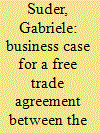

|
|
|
|
|
| Summary/Abstract |
The free trade agreement (FTA) between Australia and the European Union holds the promise of strengthened political collaboration and increasing economic integration. Both Australia and the European Union note increasing bilateral trade and investment. Oftentimes, data does not take current trends in global-value-chain participation for intermediary goods and services movements into account. Behind this sit the cross-border strategies and activities of business entities, whether multinationals or large, small or medium-sized enterprises. This article provides an in-depth investigation of the premise stemming from an FTA for Australian business. What advantages can politics hope to support through a business perspective? What is the global-value-chain part of the story, and what are the business challenges ahead? How can economic policy help shape this FTA to foster a productive bilateral business environment in a geopolitical and geoeconomic context in which regionalisation has taken on new momentum? Specific focus is given to the analysis of the higher education sector and to agriculture. These are two of the leading sectors in this FTA debate. Generating business value means setting negotiation agendas to target tariff and non-tariff barriers to counterbalance ambiguity in the conditions that shape the global business environment.
|
|
|
|
|
|
|
|
|
|
|
|
|
|
|
|
| 6 |
ID:
159685


|
|
|
|
|
| Summary/Abstract |
Economic relations between Australia and the European Union (EU) have always been strong, but they have not always been easy. They have been difficult for Australia because it associated the EU with the loss of the UK preferential export market on its entry into the then European Economic Community. And because Australia associated the EU with the original Common Agricultural Policy, which combined subsidies for agricultural production and high agricultural tariffs to make Australian agricultural exports not competitive. They have been difficult for the EU also. Australia developed a biosecurity system to protect its agricultural sector: quarantine requirements and food safety standards made the importation of EU plant and animal products too costly. Yet Australia and the EU need each other. The EU, which is Australia’s largest services trade and investment partner, supplies the business services that drive a knowledge economy and provides the credit to finance economic development. Correspondingly, the EU needs Australia both as a commercial base in Asia and as a reliable energy supplier. This article analyses the drivers and difficulties in the economic relationship between Australia and the EU as they start negotiations for a free trade agreement.
|
|
|
|
|
|
|
|
|
|
|
|
|
|
|
|
| 7 |
ID:
159684
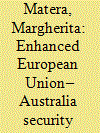

|
|
|
|
|
| Summary/Abstract |
Since January 2003, the European Union (EU) has launched over 30 civilian and military crisis management missions under the Common Security and Defence Policy. These missions have involved the participation of both EU member states and third states. In order to help facilitate the participation of third states in these missions, the EU established the Framework Partnership Agreements on crisis management, setting out the legal framework for third-state participation. In April 2015, Australia became the seventeenth country to sign such an agreement with the EU. This agreement reflects both the common interest and values shared by Australia and the EU and the extent to which EU–Australia relations have evolved and deepened over the years. In addition, the increased engagement and socialisation of Australian military and civilian personnel with individual EU member states through their participation in such operations as the International Security Assistance Force operation in Afghanistan, led by the North Atlantic Treaty Organization, and the Combined Maritime Force have further facilitated opportunities for security cooperation at the EU level. Shared concerns and interests on counterterrorism, counter-piracy, instability and capacity-building have also opened up opportunities for increased cooperation between the EU and Australia. This article assesses the significance of the Framework Partnership Agreements on crisis management for EU–Australia relations within the area of security cooperation, and examines future prospects for cooperation.
|
|
|
|
|
|
|
|
|
|
|
|
|
|
|
|
| 8 |
ID:
159686


|
|
|
|
|
| Summary/Abstract |
Despite a troubled trade history dominated by disputes over agriculture, the negotiation of a European Union (EU)–Australia free trade agreement (FTA) was initiated in 2015. The initiation of these negotiations was made possible because of the shift in EU trade policy towards the negotiation of what the EU terms ‘new generation free trade agreements’. The EU has concluded FTA negotiations with South Korea, Singapore, Vietnam and Canada, and is negotiating other FTAs— notably with Japan and the USA . The EU faces many commercial challenges to its FTA negotiations that go beyond tariff reduction, including the protection of its geographical indicators, public procurement and investor–state dispute settlement. These issues are likely to be substantial features of any EU FTA with Australia. In addition to these challenges, the promotion of sustainable development interests and human rights through FTA negotiations is an important component of the EU’s approach. The EU’s position on the trade-related aspects of sustainable development and the negotiation of human rights conditionality has presented significant challenges to the EU’s trade agenda, particularly in negotiations with Canada and Singapore. This article draws lessons from the EU’s new generation trade agreement negotiations to date. It compares these negotiations with Australia’s approach to FTA negotiations, and analyses potential stumbling blocks for an EU–Australia FTA in light of past tensions in the relationship. The article argues that shifts in both EU and Australian trade policies and positive developments in the relationship mitigate past obstacles to a negotiated agreement. However, EU– Australia relations still suffer from the tyranny of distance. The resulting deficit in foreign policy salience between the EU and Australia broadens the best alternatives to a negotiated agreement.
|
|
|
|
|
|
|
|
|
|
|
|
|
|
|
|
|
|
|
|
|